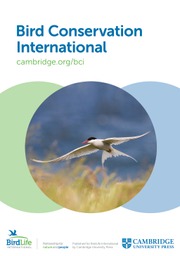Crossref Citations
This article has been cited by the following publications. This list is generated based on data provided by
Crossref.
Crawford, RJM
Altwegg, R
Barham, BJ
Barham, PJ
Durant, JM
Dyer, BM
Geldenhuys, D
Makhado, AB
Pichegru, L
Ryan, PG
Underhill, LG
Upfold, L
Visagie, J
Waller, LJ
and
Whittington, PA
2011.
Collapse of South Africa's penguins in the early 21st century.
African Journal of Marine Science,
Vol. 33,
Issue. 1,
p.
139.
Sherley, RB
Ludynia, K
Lamont, T
Roux, JP
Crawford, RJM
and
Underhill, LG
2013.
The initial journey of an Endangered penguin: implications for seabird conservation.
Endangered Species Research,
Vol. 21,
Issue. 1,
p.
89.
Sherley, Richard B.
Barham, Peter J.
Barham, Barbara J.
Crawford, Robert J. M.
Dyer, Bruce M.
Leshoro, T. Mario
Makhado, Azwianewi B.
Upfold, Leshia
and
Underhill, Les G.
2014.
Growth and decline of a penguin colony and the influence on nesting density and reproductive success.
Population Ecology,
Vol. 56,
Issue. 1,
p.
119.
Lubbe, A
Underhill, LG
Waller, LJ
and
Veen, J
2014.
A condition index for African penguin Spheniscus demersus chicks.
African Journal of Marine Science,
Vol. 36,
Issue. 2,
p.
143.
Sherley, Richard B.
Waller, Lauren J.
Strauss, Venessa
Geldenhuys, Deon
Underhill, Les G.
Parsons, Nola J.
and
Hughes, William
2014.
Hand-Rearing, Release and Survival of African Penguin Chicks Abandoned Before Independence by Moulting Parents.
PLoS ONE,
Vol. 9,
Issue. 10,
p.
e110794.
Parsons, NJ
Gous, TA
van Wilpe, E
Strauss, V
and
Vanstreels, RET
2015.
Herpesvirus-like respiratory infection in African penguins Spheniscus demersus admitted to a rehabilitation centre.
Diseases of Aquatic Organisms,
Vol. 116,
Issue. 2,
p.
149.
Connan, Maëlle
Hofmeyr, G. J. Greg
Pistorius, Pierre A
and
Ropert-Coudert, Yan
2016.
Reappraisal of the Trophic Ecology of One of the World’s Most Threatened Spheniscids, the African Penguin.
PLOS ONE,
Vol. 11,
Issue. 7,
p.
e0159402.
Morten, J. M.
Parsons, N. J.
Schwitzer, C.
Holderied, M. W.
and
Sherley, R. B.
2017.
Body condition as a quantitative tool to guide hand‐rearing decisions in an endangered seabird.
Animal Conservation,
Vol. 20,
Issue. 5,
p.
471.
Parsons, Nola J.
Vanstreels, Ralph E. T.
and
Schaefer, Adam M.
2018.
PROGNOSTIC INDICATORS OF REHABILITATION OUTCOMES FOR ADULT AFRICAN PENGUINS (SPHENISCUS DEMERSUS).
Journal of Wildlife Diseases,
Vol. 54,
Issue. 1,
p.
54.
Fustukjian, Ari H.
Flower, Jennifer E.
Sirpenski, Gayle
and
Tuttle, Allison D.
2018.
Prognostic indicators for survival in African penguin chicks (Spheniscus demersus): A retrospective analysis.
Zoo Biology,
Vol. 37,
Issue. 5,
p.
347.
Klusener, Romy
Hurtado, Renata
Parsons, Nola J.
Vanstreels, Ralph Eric Thijl
Stander, Nicola
van der Spuy, Stephen
Ludynia, Katrin
and
Munderloh, Ulrike Gertrud
2018.
From incubation to release: Hand-rearing as a tool for the conservation of the endangered African penguin.
PLOS ONE,
Vol. 13,
Issue. 11,
p.
e0205126.
Vanstreels, Ralph E. T.
Parsons, Nola J.
Pistorius, Pierre A.
and
Schaefer, Adam M.
2019.
PROGNOSTIC INDICATORS OF IMMATURE REHABILITATED AFRICAN PENGUINS (SPHENISCUS DEMERSUS) IN SOUTH AFRICA.
Journal of Wildlife Diseases,
Vol. 55,
Issue. 4,
p.
758.
Micklem, I. A.
Connan, M.
Stander, N.
and
McQuaid, C. D.
2021.
Influence of ontogeny on stable isotope ratios and trophic discrimination factors of African penguin (Spheniscus demersus) tissues.
Marine Biology,
Vol. 168,
Issue. 7,
Bhering, Renata Cristina Campos
Mayorga, Luis Felipe Silva Pereira
Hurtado, Renata
Egert, Leandro
and
Vanstreels, Ralph Eric Thijl
2022.
Resightings of Magellanic penguins (Spheniscus magellanicus) rehabilitated and released in eastern Brazil, with remarks on injuries and feather damage caused by flipper bands.
Ornithology Research,
Vol. 30,
Issue. 1,
p.
52.
Froehlich, Fiona
Forbes, Neil
Carrasco, Daniel Calvo
Ludynia, Katta
Parsons, Nola J.
Worsfold, Rebekah Dutton
and
Dutton, Tom
2023.
The Effects of Critical Care Nutrition on Weight Gain in African Penguin (Spheniscus demersus) Chicks.
Journal of Avian Medicine and Surgery,
Vol. 37,
Issue. 3,
Vanstreels, Ralph E.T.
Parsons, Nola J.
Sherley, Richard B.
Stander, Nicky
Strauss, Venessa
Kemper, Jessica
Waller, Lauren
Barham, Barbara J.
and
Ludynia, Katrin
2023.
Factors determining the number of seabirds impacted by oil spills and the success of their rehabilitation: Lessons learned from Namibia and South Africa.
Marine Pollution Bulletin,
Vol. 188,
Issue. ,
p.
114708.
van Niekerk, Charnè
and
Pillay, Neville
2024.
Behavioral responses of vervet monkey
Chlorocebus pygerythrus
infants in a novel fostering program
.
Journal of Applied Animal Welfare Science,
Vol. 27,
Issue. 2,
p.
330.




